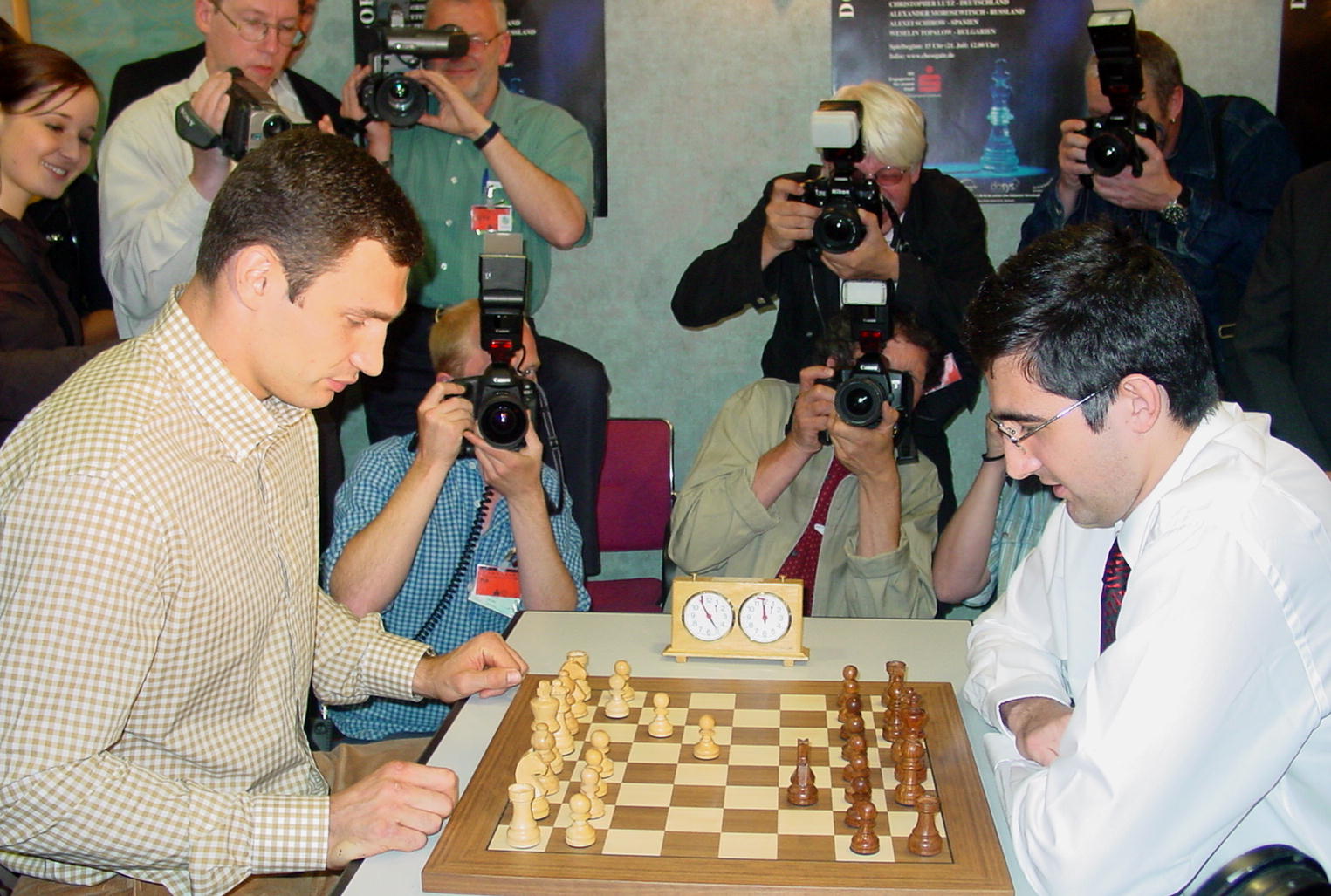Back to the Future
A History Of The Dortmund Chess Days
by Matthias Langrock
Chess is sport. But chess is also art, beautiful to look at and open to interpretation. One of the greatest works of art of the royal game turns 48 this summer: the Dortmund Chess Days. Time for a look back at this tournament, which resembles an opera: an overture is followed by five acts full of suspense and drama, with highs and lows.
THE OVERTURE: SPASSKI VS. FISCHER
New Year's Day 1972. At 9:30 in the morning, the phone rings at Dortmund's Chief Executive Hans-Dieter Imhoff. On the other end of the line is Eugen Schackmann, head of the city's press and information office. He wants to speak to Imhoff about chess. Dortmund is to host the World Championship. Spasski against Fischer, Soviet Russian against US American, East against West, a duel that is to direct the eyes of the world to chess. And thus on Dortmund, wishes Schackmann, who himself can hardly move the pieces. He wants to improve the image of his city, which the German public regards as the capital of beer and coal mines and whose once-glorious BVB soccer club will be relegated from the 1st Bundesliga this summer. "The then-common image was, 'They're hardworking people, they can kick around a ball, but they don't have much else on the ball,'" Schackmann says when asked about the circumstances later in 2003. In short, the Dortmunders were regarded as the dunderheads from the Ruhr region. Chess was "exactly the counterpoint we needed". On that New Year's Day in 1972, Schackmann convinces the city director Imhoff and drives to the restaurant of the TV tower. There he meets Klaus Neumann, a chess maniac, who is looking around Europe with his friend and chess-playing colleague Friedhelm Bachmann. German chess federation (DSB) tournament director Helmut Nöttger, DSB president Ludwig Schneider and Westfalenhallen boss Hermann Heinemann are also at the dinner. Schneider later tells Schackmann that he has never experienced a city making such a far-reaching decision within 24 hours.
Not that Dortmund gets the world championship. Instead, Reykjavik wins the bid and there Bobby Fischer becomes the 11th world champion in chess history after a sensational battle with a 12.5:8.5 victory over Spassky.

Eugen Schaackmann and Boris Spassky at Dortmund TV-tower restaurant 1973 (press office Dortmund Chess Days)
But the DSB is enthusiastic about Dortmund and wants to hold the 2nd International German Individual Championship here in 1973.
"All the decisive things that move you in the world happen because some people do more than they should have done," says Eugen Schackmann.
Neumann, Bachmann, Schackmann do more. Each, what they can contribute. "Without Bachmann's money and without Neumann's diligence, none of this would have been possible. Without Neumann and Bachmann, Schackmann would never have been able to do chess campaigning for Dortmund," says the PR man. And not without the support of the city of Dortmund either. Chief city director Imhoff ("Do everything you can"), like his successor Harald Heinze, had always stood behind the Chess Days.
The tournament begins on May 17, 1973 within Westfalenpark. Boris Spassky is also sitting at the board. The first appearance of the ex-world champion since his fight against Fischer attracts 4500 spectators. According to press reports, American journalists are instructed to cable all moves of the tournament to New York - to Fischer. But the winner of the tournament is the Berlin grandmaster Hans-Joachim Hecht. With the same number of points, he finished ahead of Spassky and the Swede Ulf Andersson.
ACT 1: CHESS IN THE BEER TOWN – DEEP SWIGS AFTER SMART MOVES
The championships ended on June 2, 1973, and just one day later three of the participants were back at the board in Dortmund: Andersson, the Finn Heikki Westerinen, and the Slovenian Bruno Parma. The idea of staging a second tournament and calling it "Chess Days" came to the Neumann/Bachmann duo around the turn of the year in Hastings. The Hungarian Ernö Gereben, NRW champion Dr. Peter Ostermeyer and the local greats Rainer Wittmann, Werner Nautsch, Karl-Heinz Hüttemann, Helmut Kuttnick and organizer Bachmann are the other participants. Bachmann can impressively convince himself of the class of his opponents. With 2/9 he takes the last place. Neumann demonstrates prophetic gifts toward the end of the tournament, about which he proudly announces to the press
"a new child is born".
There are hardly any similarities to today's tournament. Nowadays, the preparations take around a year; back then, a few weeks were enough. However, the organizers - and this is by no means common for all chess tournaments - charge entry fees then as now. The money still hardly contributes to the event's budget. And the players of that time did not get rich. Winner Westerinen, who played 24 games in 24 days in Dortmund, received a travel case and a bag, as did Dr. Peter Ostermeyer for his performance as the best German.
For Eugen Schackmann, the first encounter with the top players meant a slight culture shock. As recently as 2003, he could smile about the fact that Ostermeyer, who was about 30 years old at the time, came to the games every day with his mother. Schackmann does not spend much time with the players. He has to look for suitable premises, sometimes raising 3,000 and sometimes 5,000 deutschmarks in sponsorship money. Good contacts help. He contributes what he can from the budget of the press office and sometimes orders 10,000 fewer brochures for other events in order to be able to print and stick posters for the chess days with the money. What cannot be raised in this way is initially provided by Bachmann and later increasingly by the Stadtsparkasse. Neumann convinces restaurant owners to donate a warm dinner to the chess players. Scores of helpers sacrifice their vacations or school vacations "for a song". "A troop I could rely on. That was an ideal starting situation back then that would never have come back," Schackmann, who retired in 1991, retrospects.
In the 18 years under Schackmann's leadership, the tournament gained in stature. The showdown of local players with top foreign players from the early years gave way to a clash of mainly foreign grandmasters and international masters. Romanishin (1976), Smejkal (1977), Andersson (1978) and Hort (1980) were among the winners. In 1974, women's world champion Nona Gaprindashvili plays and takes third place, and in 1978 she finishes in second place.
Four years later, the organizers set up their own women's tournament. "It was normal for men to play chess. That women play chess was news," says Schackmann. The image has also changed: What had been the "city of deep moves" that demanded chess players "make deep swigs after smart moves" (according to the slogans of the breweries that acted as sponsors), becomes the new slogan "An intelligent game in an intelligent city for intelligent people from all over the world.", an older saying of the former world champion and FIDE president Max Euwe adopted by Gerd Kolbe, then a press office employee, and the team of organizers in 1976.
In 1980 Garri Kasparov comes to Dortmund, although not for the Chess Days. Klaus Neumann has brought the World Youth Championship to Dortmund, which the 17-year-old Kasparov wins with aplomb. Five years later he becomes World Chess Champion.
Klaus Neumann gives up his post as tournament director in 1982. The enormous time commitment is poorly compatible with his job as a self-employed insurance agent. But he remains closely connected to chess as a player and as chairman of the renowned SC Hansa Dortmund, which he himself founded. In November 1999 Neumann dies at the age of 68. Friedhelm Bachmann has also not lived for decades. The last of the Schachtage initiators to die was Eugen Schackmann in 2018.
With Jürgen Grastat from the Schachfreunde Brackel, Neumann's successor is ready in 1982. The staff changes, the Grandmaster Tournament becomes stronger and stronger and the number of participants in the Open, played for the first time in 1975, increases as does the range of tournaments. In 1991, three Grandmaster Tournaments, a Master Tournament and an Open Tournament with 250 participants take place at the Berufsförderungswerk Hacheney. In 1990 and 1991 the GM tournament reaches category 13. Alexander Chernin wins in 1990 ahead of Boris Gelfand.
But the biggest sensation is caused by the three Polgar sisters, apostrophized as prodigies. Zsuzsa comes third in the A tournament and Judit takes 5th place in the B tournament, in which her sister Zsofia comes last with four points from eleven games. In 1991 too, the Chess Days receive a young visitor from Hungary. The 11-year-old Peter Leko reaches ninth place in the master tournament against regional competition. The boy loses his first Dortmund game against Markus Schäfer, now a Bundesliga player from Solingen. Peter, who wanders around the playing venue with slippers on his feet and a gym bag in his hand after his work is done, lands his first victory in the fourth round against Jordanka Micic, later a member of the German Olympic women's team.
ACT 2: THE HIGHLIGHT – THE 1992 CHESS MEETING
In 1991, the 19th Chess Days are the last under Eugen Schackmann's leadership. The head of the press office hands over to Gerd Kolbe. He secures a co-organizer, namely his colleague Carsten Hensel, who gained experience in organizing major events at the 1989 World Table Tennis Championships. Grastat, Kolbe and Hensel want to make something big out of the Chess Days. "Many grandmasters from the Eastern bloc were playing. Yet, the national press had no interest in the tournament," Hensel notes in retrospect.

Dortmund 1992: Garri Kasparow along with co-winner Vasily Ivanchuk (Press office Dortmunder Schachtage)
Marking a chess highlight in the early 1990s is only possible with one person: Garri Kasparov. The world champion dominates his sport both on the board and in the media. At the Cebit computer fair in 1991, Hensel and Chess Meeting spokesman Pit Schulenburg make contact with Andrew Page, the Russian's manager. They promise a top-class tournament – and an entry fee of $40,000. Kasparov will receive another 25,000 dollars for a simultaneous match. Page agrees, and the adventure can begin.
For the first time in its history, the Chess Days are dependent on serious financial support. But time is short for the acquisition of major sponsors. In May, the city's Council of Elders refuses the requested guarantee of around 620,000 marks. Mayor Günter Samtlebe steps in, the Initiativkreis Ruhrgebiet pledges 250,000 marks, and so the council finally only has to guarantee 376,000 marks.
"Kasparov may come," is the headline in the Dortmund press.
Schulenburg and Hensel search for adequate opponents for the world champion. Kasparov himself is desperate to see the then number two in the world rankings, Vassily Ivanchuk, among his opponents. But the Ukrainian is unimpressed by financial commitments from the organizers and only agrees to play after his wife at the time, Alisa Galliamova, is invited to the Open. The Dortmund team garnishes the top foreign field (besides Kasparov and Ivanchuk, Adams, Anand, Bareev, Kamsky, Piket, Salov, and Shirov are playing) with the German Dr. Robert Hübner. Category 17 is reached, the Elo average is 2662 - the Chess Days have arrived at the top of the world.
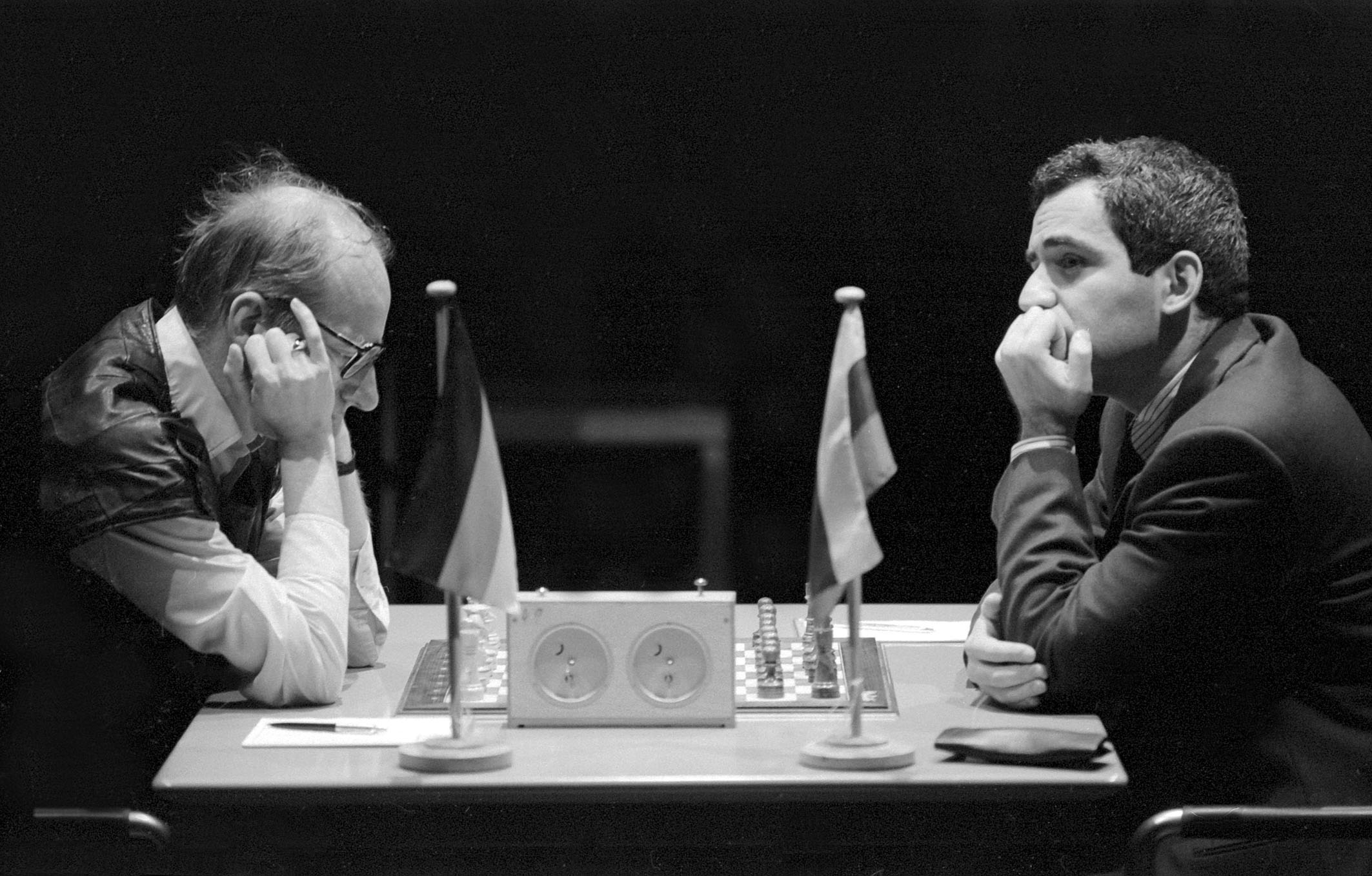
Dortmund 1992: Robert Hübner against Garri Kasparov (Picture: Christian Lünig, Arbeitsblende)
The Chess Meeting is not only a sporting event. 540 participants play in three Open tournaments; those who want to compete with dozens of grandmasters in the A-Open and have less than 2295 Elo points pay the handsome sum of 250 marks. Nevertheless, the Open is becoming a subsidy event, says Pit Schulenburg. "Taking high additional rental costs plus board and lodging for scores of foreign grandmasters was necessary to maintain the festival character and guarantee a strong Open." First place was later to be shared by the then still untitled 16-year-old Vladimir Kramnik For the first time, spectators – a total of 11,000 paying fans over the nine days of the event – could follow the games on monitors. On Easter Sunday alone, around 2,000 flock to the Westfalenhallen. Next to the playing hall, Dr. Helmut Pfleger and Vlastimil Hort comment on the fights of the matadors, who sit in Hall 2a like in a boxing ring, surrounded by the audience.
From a sporting point of view, the tournament delivers what everyone had hoped for. The favorite Kasparov wins with the last move of the tournament, but not without having lost two games first - and that happened very rarely until the end of his career. He loses to Gata Kamsky and - all of chess Germany is enraptured - to Robert Hübner. Looking back, Carsten Hensel sees the tournament as the commercial breakthrough of the "media sport of chess". The Chess Meeting had proved that you can reach a "very, very large audience with comparatively little effort" with chess. The self-confident organizers proclaim: "Anyone who wants to take our place as a chess stronghold again will have a tough nut to crack."
ACT 3: DECLINE AND RAPID RESURGENCE
But first Grastat, Kolbe & Co have to crack a hard nut. The 21st Chess Days 1993, to be slimmed down anyway, are threatened to be cancelled after a budget gap of several ten thousand D-marks becomes apparent in the summer of 1992. Finally, the council approves a subsidy of 80,000 marks; 100,000 marks are paid by the Stadtsparkasse, a modest total budget compared to the million mark sum of the previous year. "We fell into a sort of limbo," Hensel says today. The organizers move back from the Westfalenhalle to the Berufsförderungswerk, and only eight players take part in the GM tournament. Anatoly Karpov wins a category 16 tournament ahead of Vladimir Kramnik and Christopher Lutz.
Through personal contacts and a professional approach, the triumvirate of Hensel, Grastat and Kolbe returned to the top in 1994. The chess days change their traditional date and from now on take place in the summer months. Since the city's theater and opera are on break, the chess players can pile in Dortmund's "fine parlor".
Kasparov doesn't come back, after some back and forth about hosting the 1995 World Championship, which he finally wins against Anand in New York's World Trade Center, the differences are too big. Instead, Vladimir Kramnik becomes Mr. Dortmund. He wins the 1995, 96, 97, 98, 2000, 2001, 2006, 2007, 2009 and 2011 Chess Days. In 1999 and in the 2002 Candidates Tournament, Dortmund's foster child Peter Leko wins. Carsten Hensel, who also managed both of them between 1998 and 2009, sees one of the tournament's strengths in its reliance on the Russian and the Hungarian. "We trusted in Peter and Vladimir when they were not yet at the absolute top. We even let Leko play in 1994 and 1995 when he would kill the category. Commitment, instinct and a lucky hand ensured that "you can create a major event even without Kasparov," says Hensel.
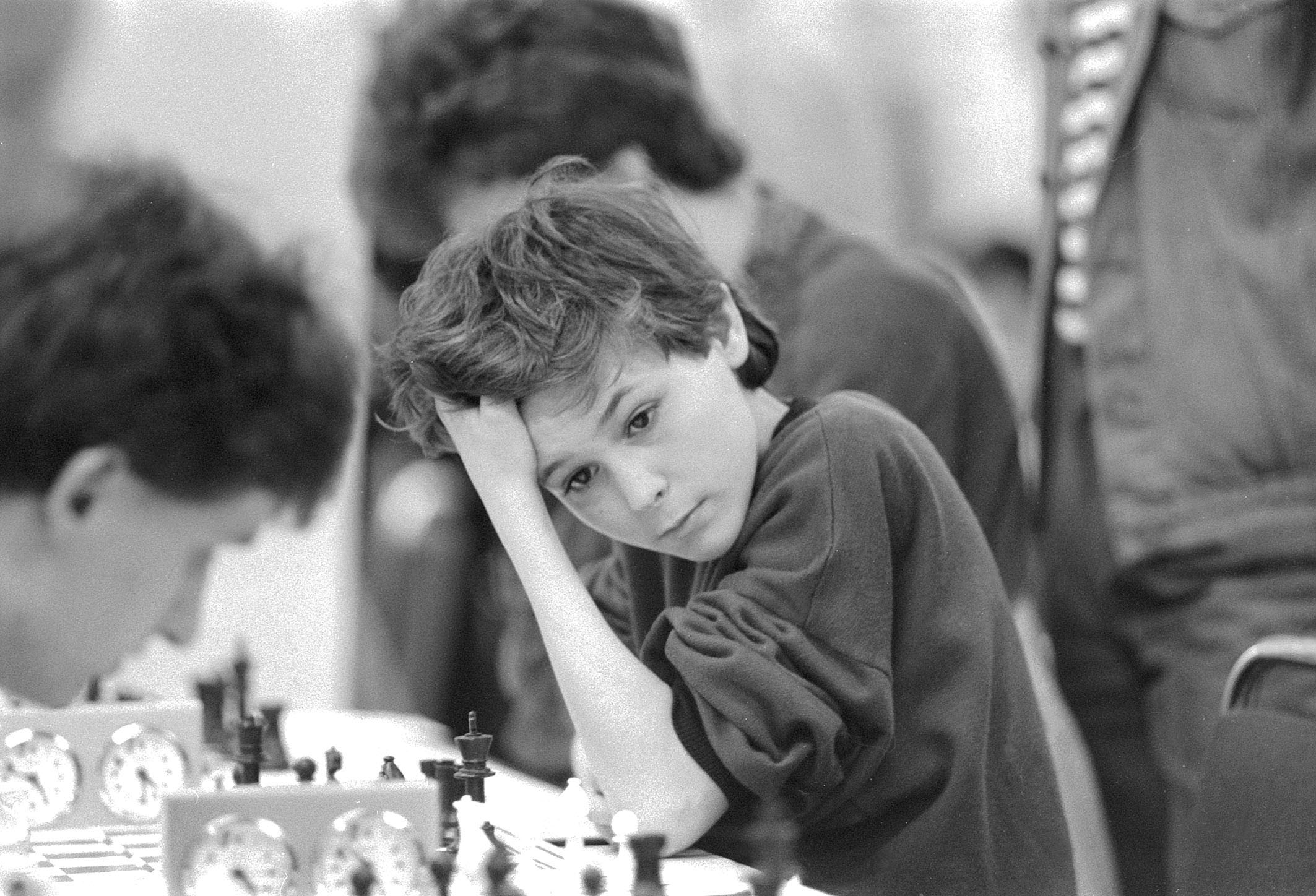
Dortmund 1992: Twelve-year-old Peter Leko at his second visit of Dortmund (Picture: Christian Lünig, Arbeitsblende)
In addition, Hensel and Kolbe see the success of their tournament in the support they provide for the players and the team. On "many nice evenings," the drivers, cashiers and other helpers on site got close to the "very big boys". Even among the players, a relationship of trust has developed.
From 1994, the tournament also becomes a showcase for new transmission technology. The commentaries by Helmut Pfleger, Klaus Bischoff and Eric Lobron are transmitted by radio into the playing hall and broadcast to the audience via headphones. The spectators follow the games on large screens. The display of the remaining time, which creates suspense in the time trouble phase, is becoming more and more accurate. "We were certainly the best presented chess event in the 1990s," says Hensel.
Unless exceptional events such as the 2002 Candidates Tournament intervene, the organizers plan to have Kramnik, Leko and Viswanathan Anand as participants in the Chess Days at this stage. The latter had demonstrated his special attachment to Dortmund in 1996 with his honeymoon in the city. The other players must be good enough for Dortmund to remain one of the strongest tournaments in the world, along with Wijk aan Zee and Linares.
"It ought have an Elo average of 2700," says Hensel.
Gerd Kolbe is counting on at least one German player in the 90s, even if, according to Hensel, with the exception of Christopher Lutz's success in 1993, "unfortunately" they have all disappointed. At the beginning of the new millennium, the organizers' hopes rest on Arkadij Naiditsch, a home-grown talent of the Dortmund Chess School, who as a 19-year-old will celebrate his greatest success with the tournament victory in Dortmund in 2005. Who else will be invited from the squad of world-class players, which at the turn of the millennium is mainly Topalov, Shirov, Adams, Gelfand, depends on their current results, the schedule of the grandmasters, and the Dortmund budget. According to Kolbe, the budget settled at around 400,000 euros in the 2000s. Sparkasse Dortmund, which has since become the title sponsor, contributes the largest share.
Jürgen Grastat led his last Chess Days as tournament director in 2002 and handed over the baton to Stefan Koth in the same year.
Dortmund 2002: Show match between Vitali Klitschko and Vladimir Kramnik (Picture: Dagobert Kohlmeyer)
ACT 4: THE TRANSITION
Almost 18 years have passed since the first version of the preceding text appeared in the summer of 2003 in the chess magazine Karl. We have left the text almost unchanged, making adjustments mainly where they were unavoidable. The then almost 30 years long history of the Schachtage has now become almost 50 years long. Until 2019, the Chess Days continued to take place year after year; only in 2020 did the Corona virus throw a spanner in the organizers' works.
In 2002, exactly 30 years after the "prelude" of the Dortmund Chess Days, that world championship match between Bobby Fischer and Boris Spasski, Dortmund hosted the most important chess competition in its history: the Candidates Tournament, at the end of which the challenger to the then World Champion Vladimir Kramnik was determined in Peter Leko.
If the 2004 World Championship match between Kramnik and Leko hadn't taken place in Switzerland, Dortmund would have been the logical venue for this match. Both opponents have a lot in common with the city: Kramnik has won the Chess Meeting ten times. This record will remain unrivaled for years, if only because only three other grandmasters have won the tournament more than once: Finland's Heikki Westerinen in 1973 and 1975, Italy's Fabiano Caruana (2012, 2014, 2015) - and Peter Leko, who won in 1999 and 2008 in addition to 2002.
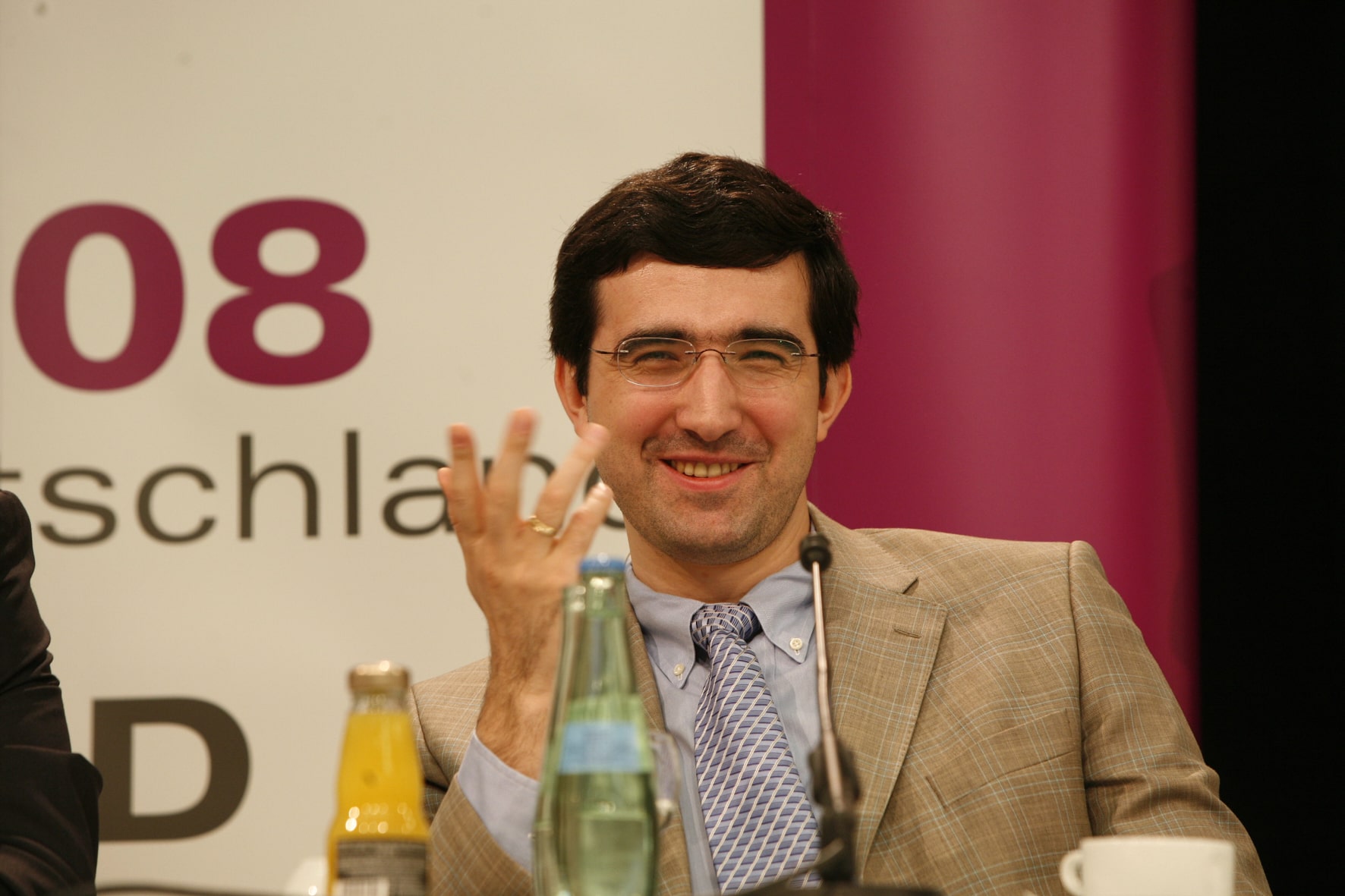
Vladimir Kramnik with ten victories in Dortmund (Picture from the World Championship Bonn 2008: Christian Lünig, Arbeitsblende)
Leko associates Dortmund with much more than just his tournament victories. He met his wife Sofia in the Westphalian metropolis. And Kramnik and Leko were kept together for several years by their joint Dortmund manager Carsten Hensel, who has also had a lot in common with the Chess Days since 1992.
But back from the people to the chess boards. The Chess Meeting grandmaster tournament remains a top-class event even after 2002. Summer after summer, several world-class players are drawn to Dortmund. The first to mention is World Champion Vladimir Kramnik, who dethroned Garry Kasparov in 2000 and plays in Dortmund every year until the end of his career in 2018. Kramnik is enough as a cart horse and figurehead, but in sporting terms a single superstar is not enough for a top tournament. For a long time, the organizers "deliver." The most top-class tournament on paper is held in 2010 with an average of 2734 Elo points.
Nevertheless, the 2007 tournament can be rated even higher.
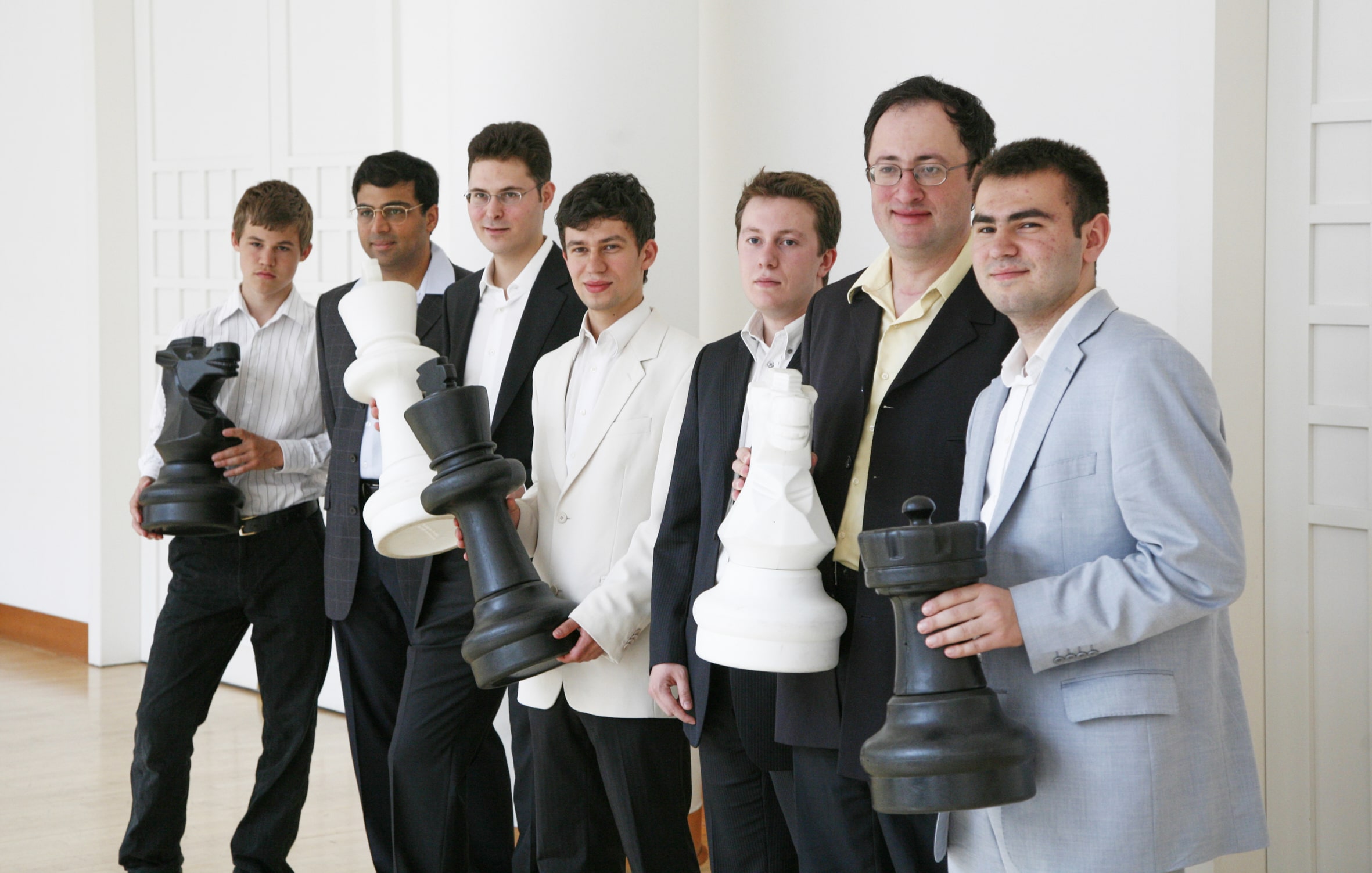
Dortmund 2007: The field of participants (Picture: Christian Lünig, Arbeitsblende)
The Elo average of 2727 is razor-thinly below that of three years later, but firstly there are a total of eight participants at the boards in the 2007 tournament, while three years later there are only six. Secondly, what kind of illustrious names are there in 2007? Kramnik, the reigning world champion, meets the man who will take the title from him only shortly afterwards in Mexico City: Viswanathan Anand of India. Their game ends in a draw in the first round. What could only be guessed at the time: Anand's successor also sits at the board in Dortmund and celebrates his premiere: the Norwegian Magnus Carlsen. The then 16-year-old had nothing to do with the tournament success. He lost to Kramnik, drew the other six games and finished in 6th place.
Carlsen will only come to Dortmund one more time, in 2009, when his starting position is already different: The Norwegian is ranked 3rd in the world with 2770 Elo and is seeded 1st in the double-round tournament. Things looked good for him for a long time: In the very first round he wins against the Russian Jakovenko and leads the table alone until the seventh of ten rounds. But in round 8 the dream of a Dortmund victory comes to an end: Carlsen loses again to Kramnik. In the end, the Norwegian is one point behind the then already dethroned World Champion in a shared second place.
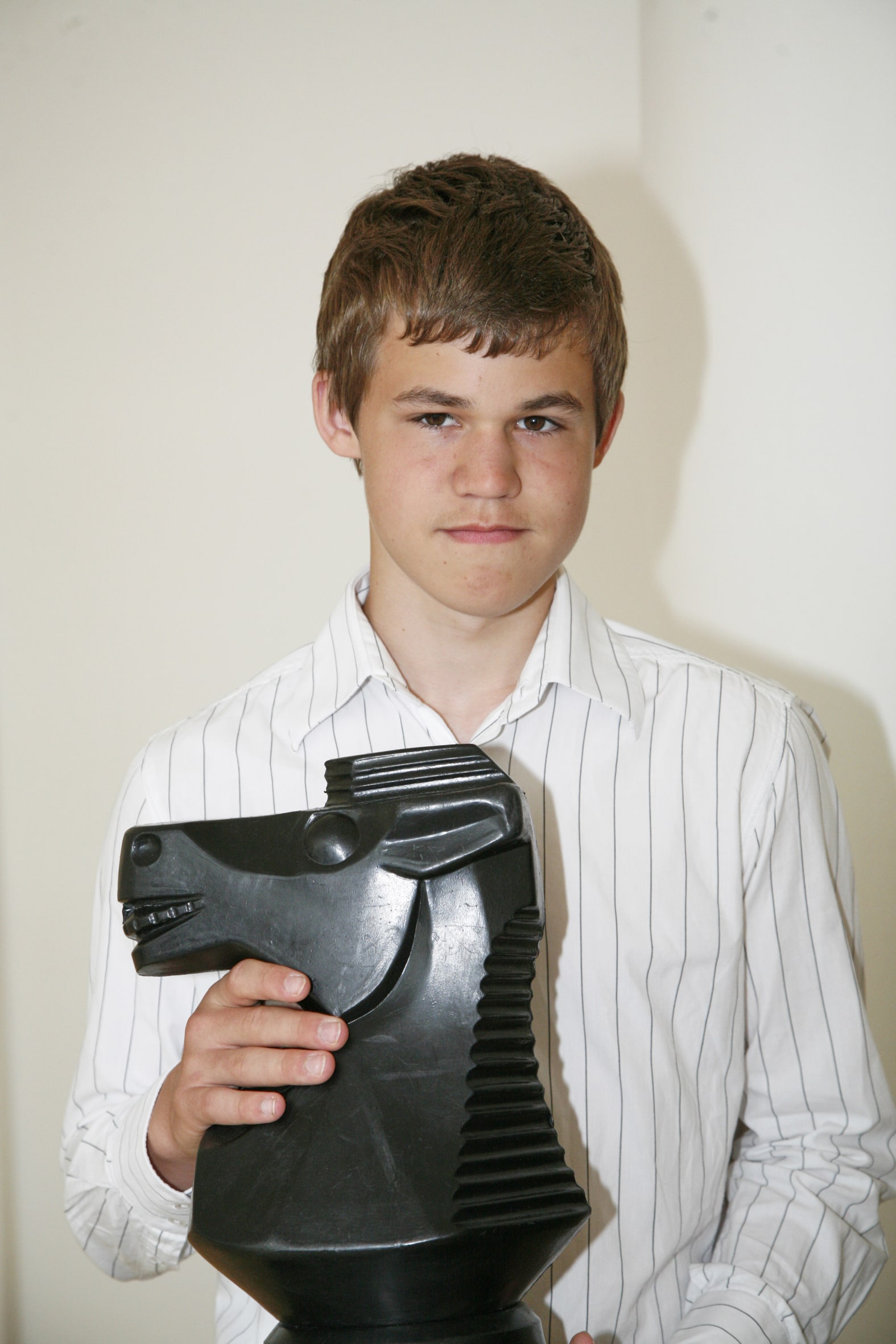
Dortmund 2007: Magnus Carlsen at his first attendance in Dortmund (Picture: Christian Lünig, Arbeitsblende)
So the Dortmund record of the man who has been World Champion since 2013 and has dominated the chess world ever since is not all that impressive, with two wins, two losses and thirteen draws. Nevertheless, the organizers of the Chess Trophy would naturally be licking their lips if they could lure Carlsen to Dortmund.
Just how high-caliber the Chess Days have been over all these years is shown even more impressively by another fact than the rather meager record of the current World Champion: If you disregard Bobby Fischer,
not only has every World Champion since Boris Spassky played in Dortmund (Karpov, Kasparov, Kramnik, Anand, Carlsen), but also all their respective World Championship final opponents since 1978: Korchnoi, Short, Leko, Topalov, Gelfand, Karjakin and Caruana.
In purely sporting terms, the tournament has lost importance since 2010 despite all the stars. The claim of many years to sign up world-class players almost without exception, supplemented by one or two German players as local heroes and, since 2006, by the winner of the Moscow Aeroflot Open, has no longer been consistently maintained.
The budget has also played a certain role. Chess has become much more popular in recent years thanks to the Internet and a large number of competing high-level tournaments. The top players can therefore choose their engagements and demand significantly more money - money that cannot be recouped at all through spectator admission fees, and not just since Corona.
Renowned players have still come to Dortmund year after year, but not all have proved as "viewer magnets". In the Dortmund city administration, too, the tournament no longer plays the role of earlier years as it would from 1994 onwards, when the participants competed against each other in the opera house or the municipal theater. One had arrived now in the Orchestra and thus rather in a cozy chamber than in the city's large, fine parlor.
There has always been an Open tournament for ambitious club players, but this has also lost importance, as it has become increasingly unattractive for national and international master players and was also spatially separated from the main event. At least there was now and then in a second round robin tournament an opportunity for young players to fulfill the International Master title norm requirements. An opportunity which, among others, was taken by the current press spokesman of the Chess Days, Patrick Zelbel.
ACT 5: A PRESTIGIOUS VENUE, ALL UNDER ONE ROOF
But as from now, many things are to be different, a new concept is to be implemented, which the organizers already wanted to tackle in 2020. Organizers, by the way, who have known the tournament for a long time. Carsten Hensel, for example, the former Kramnik and Leko manager and press spokesman for the 1992 Chess Meeting. His credo is:
"We're returning to the most prestigious venue in our city. Here we can organize all competitions under one roof and also realize many new ideas and innovations."
Hensel, who has replaced Gerd Kolbe as event director since 2020, says of the plans: "The tournament's old tradition of implementing a chess festival of all performance classes under a single roof is near and dear to us. And we have developed ideas on how to stage top chess more attractively, also to counteract the draw death in chess games of world-class grandmasters."
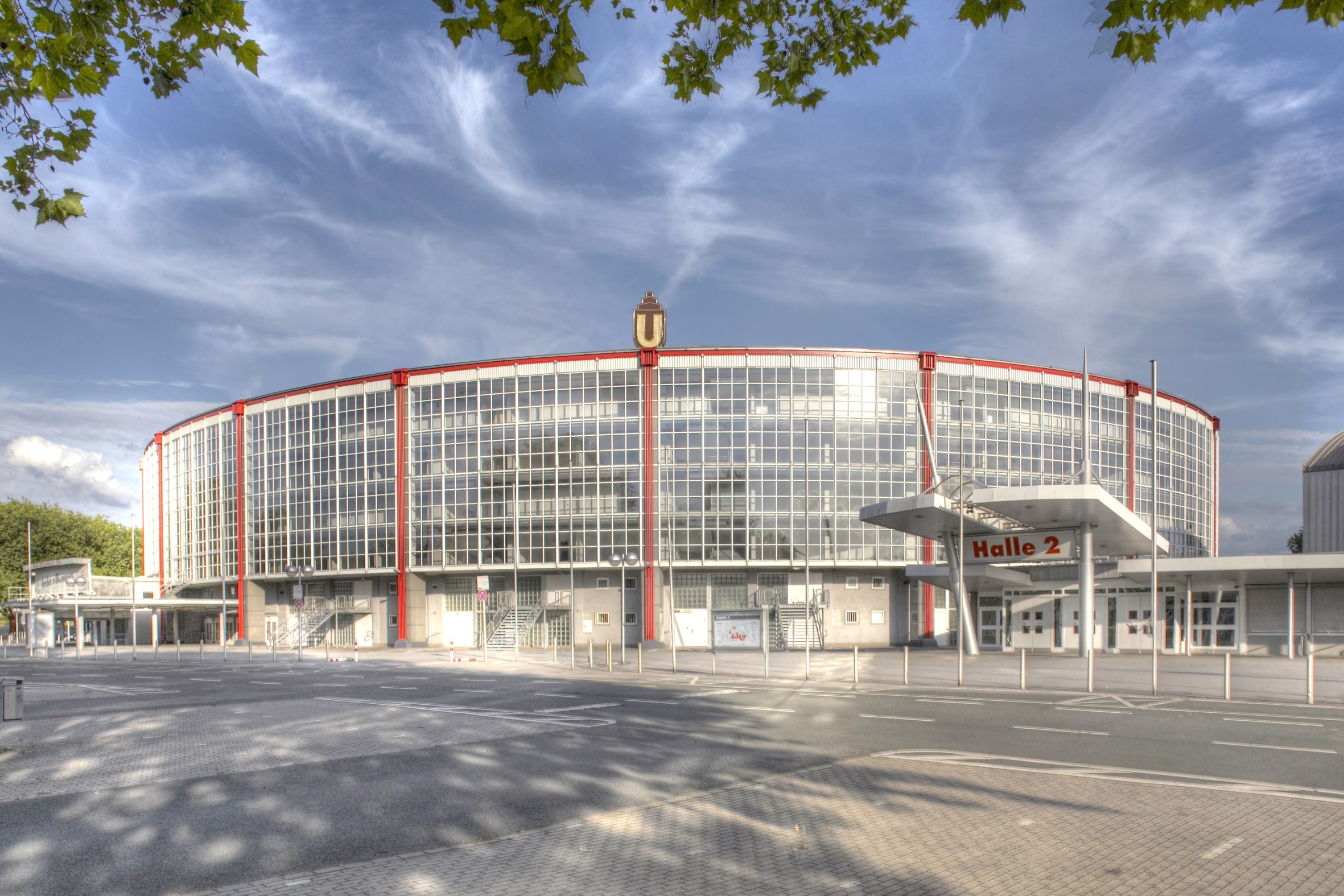
Westfalenhallen Congress Center (Picture: Christian Lünig, Arbeitsblende)
It's not just the tournament mode that will change. A digitalization offensive is also planned. TV broadcasting, streaming, a dedicated online editorial team - these are important, contemporary features. "We will work with moving images to give chess fans all over the world insights into the Dortmund tournament. And this will also be live," announces Guido Kohlen as technical director of the event.
Chess is a significant medium, among others in art, science, education and the advancing digitalization. "We would like to address all of these focal points in the coming years for the benefit of the Sparkassen Chess Trophy," says Carsten Hensel.
And there is to be a very special treat that leaves well-trodden paths more than probably any other change: an event on the theme of "No-castling chess" - a chess variant that is actually completely identical to classical chess, but has one essential variation in store: the prohibition to castle. The idea for this goes back to the 14th World Chess Champion Vladimir Kramnik.
"There are also already the first test games for this from the artificial intelligence AlphaZero developed by the Google subsidiary DeepMind. But we want to be the first with a big NC event of top grandmasters at the highest level," Patrick Zelbel says in this regard.
All this is to take place in the Westfalenhallen, to which the tournament will return for the first time since the Candidates Tournament in 2002. A new level of creativity should also bring more international attention to the Chess Days in the course of the coming years, of course entirely in the interest of the city of Dortmund and the title sponsor Sparkasse Dortmund.
To implement their plans successfully, a dedicated team is ready and waiting. For example, the new tournament director Andreas Jagodzinski, who succeeds Stefan Koth in this role. Koth, chairman of the organizing association IPS, now acts as the event's executive secretary. Guido Kohlen, who has been involved since 2002, is back on board as technical director. He is joined by Christian Jochmann (also vice-chairman of the Dortmund Chess Association), Sabine Oecking as artistic director and, last but not least, Vladimir Kramnik himself. The Dortmund record winner supports the organizing team as their emissary and representative.
Kramnik and Hensel are the two people who will bridge the gap between the present in 2021 and the successful past: the Chess Meeting of 1992. No one is thinking about the next 29 years yet, but if the new tournament concept is accepted - and if Corona doesn't throw a second wrench in the organizers' works - there's nothing to fear for the next few years of summerly top chess in Dortmund.



